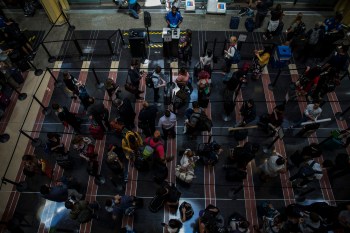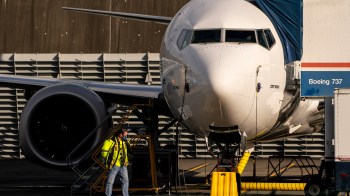Leaving on a jet plane… eventually
TEXT OF STORY
Scott Jagow: If you’re flying this holiday weekend, all I can say is good luck. Here’s Steve Tripoli:
Steve Tripoli: FAA head Marion Blakey has this advice for holiday weekend fliers: “Brace up and bring a good book.”
Kate Hanni: It’s almost as if they want us to be conditioned to that it’s OK.
But it’s not OK, says Kate Hanni of the Coalition for an Airline Passengers’ Bill of Rights. Hanni says the FAA needs to modernize air traffic control which it’s pushing Congress to do.
For now she says airlines need to put fewer planes in the air, and airports need to retrieve passengers with connections from flights stranded without a gate.
Hanni’s group is setting up a mock airliner on the Capitol Mall September 19 to give lawmakers a taste of delays.
Hanni: It’ll be hot and sticky, and it’ll have little overflowing porta-a-potties, and we’ll have flight attendants and pilots giving you almost no information.
The FAA’s Marion Blakey says if Congress doesn’t quit stalling on new funding methods for the agency, “every weekend will feel like Labor Day.”
I’m Steve Tripoli for Marketplace.
INTERVIEW: WHAT’S THE PROBLEM?
Doug Krizner: If you’re flying this holiday weekend, brace yourselves. The number of passengers is expected to be up 3 percent from last year. Experts agree the best way to solve the problem is to rebuild the nation’s air traffic control infrastructure. The government’s planning to spend to $15 billion over the next two decades to do just that. The contract for the first phase was awarded yesterday to ITT. Let’s bring in BusinessWeek reporter Chris Palmeri. He’s help to write their cover story on “Fear & Loathing At The Airport.” Chris, what is the condition of the control system right now?
Chris Palmeri: The biggest problem is just this very, very antiquated system of technology where flight controllers are squawking on radios and pilots are dependant on radar which, you know, anybody that’s got a GPS system in their car now understands that satellites should play a much bigger role.
Krizner: Do they have incentive to move quickly to create a new system?
Palmeri: The manufacturers absolutely have incentive, the airlines say ‘well we’re waiting for the FAA.’ It’s so complex and there are so many people involved it is just very difficult to get everybody to agree on what the system’s going to look like and who’s gonna pay for what.
Krizner: What are the downsides here in terms of how much negative impact this could have on passengers and on the economy?
Palmeri: Well right now we’re just ending what some people have called “the summer of hell,” just you know record delays . . . I think a big part of the problem is that the airlines scheduled too many flights at peak hours but in reality, runway space is short and there’s only so many planes that can take off.
Krizner: Give me some of the highlights as we look back at the “summer of hell.”
Palmeri: Well we’ve had people on the ground for hours, we had a flight from Caracas you might remember where the passengers were banging on the overhead compartments and everyone had to be taken off the flight and gone through security for questioning. Nationally, a third of all flights are late by as much as 50 minutes. It’s really unacceptable.
Krizner: Chris Palmeri is BusinessWeek reporter here in Los Angeles. Hey Chris, thanks so much for talking to us.
Palmeri: Thank you very much, fly safe.
There’s a lot happening in the world. Through it all, Marketplace is here for you.
You rely on Marketplace to break down the world’s events and tell you how it affects you in a fact-based, approachable way. We rely on your financial support to keep making that possible.
Your donation today powers the independent journalism that you rely on. For just $5/month, you can help sustain Marketplace so we can keep reporting on the things that matter to you.


















